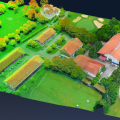
The Japanese Space Agency (Jaxa) has launched a rocket carrying the country's first GPS satellite.
The H-IIA rocket was launched from the Tanegashima Space Center carrying the satellite named ‘Michibiki’.
Currently Japan uses the US GPS network of 30 satellites, but the government hopes the system will be enhanced by the new satellite which will sit in a different orbit to allow it to stay above Japan for eight hours a day.
Currently urban and mountainous areas receive intermittent coverage.
Eventually two more satellites will join it to provide 24-hour coverage for Japan and will dramatically increase the GPS accuracy, though plans for their launch have been delayed due to budgetary constraints.
The government is covering 60 per cent of the roughly 73.5bn yen (AUD 880bn) development costs for the satellite.
Mitsubishi Electric, Hitachi and Toyota amongst others set up a private company to coordinate use of the proposed Japanese satellite network and share the cost burden.
Japan is amongst a number of countries around the world that wants to reduce its reliance on the US GPS network.
Russia currently operates its own positioning system, known as GLONASS, whilst Europe is developing a new Galileo system. China is rolling out its COMPASS program, whilst India is developing a limited area positioning system.







